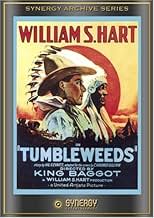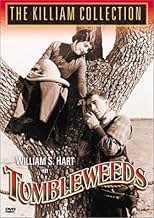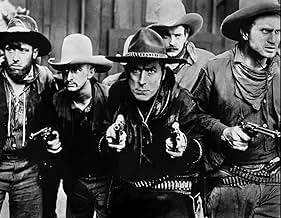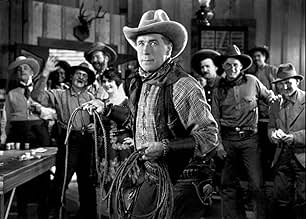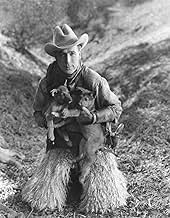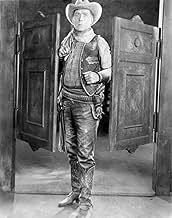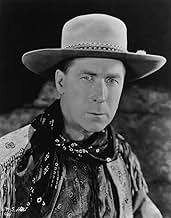AVALIAÇÃO DA IMDb
6,6/10
738
SUA AVALIAÇÃO
Adicionar um enredo no seu idiomaThe government will grant a fringe of terrain for the settlers who want to live and work there. The starting sign will be a gunshot which will iniciate the run for the best fields and claims... Ler tudoThe government will grant a fringe of terrain for the settlers who want to live and work there. The starting sign will be a gunshot which will iniciate the run for the best fields and claims.The government will grant a fringe of terrain for the settlers who want to live and work there. The starting sign will be a gunshot which will iniciate the run for the best fields and claims.
- Direção
- Roteiristas
- Artistas
William S. Hart
- Don Carver
- (as Wm. S. Hart)
- …
Richard Neill
- Bill Freel
- (as Richard R. Niell)
George F. Marion
- Old Man
- (as George Marion)
Taylor N. Duncan
- Cavalry Major
- (as Ted Duncan)
Nora Cecil
- Pioneer Mother
- (não creditado)
Nino Cochise
- Indian
- (não creditado)
Monte Collins
- Hicks
- (não creditado)
Fred Gamble
- Hotel Proprietor
- (não creditado)
George Marion
- Homesteader
- (não creditado)
Apache Bill Russell
- Indian
- (não creditado)
- Direção
- Roteiristas
- Elenco e equipe completos
- Produção, bilheteria e muito mais no IMDbPro
Avaliações em destaque
Once it was among the most popular movies of its kind, and now it's generally remembered only by silent movie fans, but "Tumbleweeds" is a classic silent Western that's still worth seeing. To be sure, a lot of its appeal now comes from nostalgia, but in its time it was close to the top of its genre.
The opening scenes start the story nicely, and they also give it some thoughtful overtones, with cowboys Hart and Lucien Littlefield coming to realize their role as "Tumbleweeds" in a changing world. The 'tumbleweed' image is used well in developing Hart's character, as he faces the consequences of the land rush and of the personal affairs he gets involved in. The story itself has a lot of familiar elements, without many surprises, but the atmosphere and the characters are enough to carry it.
The land rush sequence is probably the most exciting part of the movie, and it is quite a fine set piece. It's later followed by a fast-paced climactic chase that also works well. The action makes a good complement to the atmosphere of the changing frontier, making it a movie that fits together nicely, and that still works pretty well.
The opening scenes start the story nicely, and they also give it some thoughtful overtones, with cowboys Hart and Lucien Littlefield coming to realize their role as "Tumbleweeds" in a changing world. The 'tumbleweed' image is used well in developing Hart's character, as he faces the consequences of the land rush and of the personal affairs he gets involved in. The story itself has a lot of familiar elements, without many surprises, but the atmosphere and the characters are enough to carry it.
The land rush sequence is probably the most exciting part of the movie, and it is quite a fine set piece. It's later followed by a fast-paced climactic chase that also works well. The action makes a good complement to the atmosphere of the changing frontier, making it a movie that fits together nicely, and that still works pretty well.
TUMBLEWEEDS (United Artists, 1925), Directed by King Baggott, stars the legendary William S. Hart (1865-1946) in what proved to become his final screen appearance. Virtually unknown by today's standards, Hart was a popular leading cowboy actor dating back to 1914, whose success would be categorized as a sort of Gary Cooper or John Wayne of his day. Hart was versatile in other roles, but westerns were his specialty, with many, including Hart himself, ranking TUMBLEWEEDS as his finest of all his westerns.
Opening title: "Man and beast – both blissfully unaware that their reign is over." Set in 1889, Dan Carver (William S. Hart), a range boss of the Box K Ranch, known as "just another tumbleweed," is introduced as a sympathetic cowboy who fails to shoot a rattlesnake only because it has as much right to be around as anyone else. He also takes in a couple of orphan wolf dog puppies to find them a home after their parent dogs have been poisoned. The plot develops as the United States Government allowing ranchers to graze cattle on their payment to the Cherokee Land Strip, 12,000 square miles of undeveloped prairie land between Kansas and Oklahoma. Riding to Caldwell, Kansas (population 200), on the edge of the Cherokee Strip, Dan spreads the news to its local residents. Journeying to his destination with "Kentucky Rose" (Lucien Littlefield), they encounter Mrs. Riley (Lillian Leighton), a widow woman with three children, who takes a liking to Kentucky Rose. After intervening with Noll Lassiter (J. Gordon Russell) for abusing a boy, Bart (Jack Murphy), and his dog, he forces the brutal man to apologize to both. Dan immediately bonds with Bart who now looks up to him as a father figure. However, after accidentally roping a young girl (Barbara Bedford) in a saloon, Dan soon learns that the girl, named Molly, happens to be sister of Bart and half-sister to the villainous Noll Lassiter. Because of his interest in Molly, Dan decides to settle down and stake out a homestead claim for himself, with the possibility of having Molly become his future wife. Noll, however, unwilling to overlook Dan's defeat over him, schemes with Benton, alias Bill Freel (Richard R. Neill), to have Dan put out of the way. They arrange in having Dave accused and arrested as a "sooner," which finds him being held prisoner inside a bull pen while the bad guys so as much as commit murder so they can legally stake the claim for themselves.
Most circulating prints of TUMBLEWEEDS consist of a 1939 reissue from Astor Pictures introducing eight minutes of spoken prologue by William S. Hart himself where he talks about his "greatest picture" from his Horseshoe Ranch in Newhall, California. After listening to Hart's speaking voice, it is much regret that this once popular actor of the silent screen never starred in at least one talkie western, even possibly a sound remake to his greatest movie, TUMBLEWEEDS. Chances are had be proceeded in his career in talkies, he most definitely would have succeeded, even if later reduced to matinée cowboy star as Tim McCoy or Ken Maynard for example. However, this 1939 prologue is the one and only chance for viewers to get to hear him speak, through his wonderful tribute to both himself and the movie itself.
Home video to TUMBLEWEEDS dating back to the 1980s either from Blackhawk or a decade later from Republic Pictures also contain the Hart prologue. Rather than the orchestral score with off-screen singing to title card songs, both video/DVD editions are piano scored by William H. Perry for the Killiam collection. Clocked at 77 minutes (not counting the prologue), it seems a shame that this and THE TOLL GATE (1920) to date have become the only two Hart westerns to have limited broadcasts on public television some decades ago. Considering that TUMBLEWEEDS is hailed as Hart's best movie makes one wonder if his other silent westerns are equally as good or even better? The films of William S. Hart deserve better recognition in movie history. At least TUMBLEWEEDS is still available (on DVD) to remain one of the finer westerns to come out from the silent movie era, along with being both an introduction and rediscovery to the great quiet-type cowboy hero named William S. Hart. (***)
Opening title: "Man and beast – both blissfully unaware that their reign is over." Set in 1889, Dan Carver (William S. Hart), a range boss of the Box K Ranch, known as "just another tumbleweed," is introduced as a sympathetic cowboy who fails to shoot a rattlesnake only because it has as much right to be around as anyone else. He also takes in a couple of orphan wolf dog puppies to find them a home after their parent dogs have been poisoned. The plot develops as the United States Government allowing ranchers to graze cattle on their payment to the Cherokee Land Strip, 12,000 square miles of undeveloped prairie land between Kansas and Oklahoma. Riding to Caldwell, Kansas (population 200), on the edge of the Cherokee Strip, Dan spreads the news to its local residents. Journeying to his destination with "Kentucky Rose" (Lucien Littlefield), they encounter Mrs. Riley (Lillian Leighton), a widow woman with three children, who takes a liking to Kentucky Rose. After intervening with Noll Lassiter (J. Gordon Russell) for abusing a boy, Bart (Jack Murphy), and his dog, he forces the brutal man to apologize to both. Dan immediately bonds with Bart who now looks up to him as a father figure. However, after accidentally roping a young girl (Barbara Bedford) in a saloon, Dan soon learns that the girl, named Molly, happens to be sister of Bart and half-sister to the villainous Noll Lassiter. Because of his interest in Molly, Dan decides to settle down and stake out a homestead claim for himself, with the possibility of having Molly become his future wife. Noll, however, unwilling to overlook Dan's defeat over him, schemes with Benton, alias Bill Freel (Richard R. Neill), to have Dan put out of the way. They arrange in having Dave accused and arrested as a "sooner," which finds him being held prisoner inside a bull pen while the bad guys so as much as commit murder so they can legally stake the claim for themselves.
Most circulating prints of TUMBLEWEEDS consist of a 1939 reissue from Astor Pictures introducing eight minutes of spoken prologue by William S. Hart himself where he talks about his "greatest picture" from his Horseshoe Ranch in Newhall, California. After listening to Hart's speaking voice, it is much regret that this once popular actor of the silent screen never starred in at least one talkie western, even possibly a sound remake to his greatest movie, TUMBLEWEEDS. Chances are had be proceeded in his career in talkies, he most definitely would have succeeded, even if later reduced to matinée cowboy star as Tim McCoy or Ken Maynard for example. However, this 1939 prologue is the one and only chance for viewers to get to hear him speak, through his wonderful tribute to both himself and the movie itself.
Home video to TUMBLEWEEDS dating back to the 1980s either from Blackhawk or a decade later from Republic Pictures also contain the Hart prologue. Rather than the orchestral score with off-screen singing to title card songs, both video/DVD editions are piano scored by William H. Perry for the Killiam collection. Clocked at 77 minutes (not counting the prologue), it seems a shame that this and THE TOLL GATE (1920) to date have become the only two Hart westerns to have limited broadcasts on public television some decades ago. Considering that TUMBLEWEEDS is hailed as Hart's best movie makes one wonder if his other silent westerns are equally as good or even better? The films of William S. Hart deserve better recognition in movie history. At least TUMBLEWEEDS is still available (on DVD) to remain one of the finer westerns to come out from the silent movie era, along with being both an introduction and rediscovery to the great quiet-type cowboy hero named William S. Hart. (***)
After a while, watching "Tumbleweeds" starts to feel like homework. The movie wore me down after a while. I've seen a lot of silent movie comedies. Many of them aged quite well. As for as dramas go, I haven't seen nearly as many. For me they haven't aged as well. They are a lot harder to watch than the comedies. Add into the mix a very stiff (and seemingly self-serious) William S. Hart and "Tumbleweeds" doesn't stand a chance. There are a few laughs and some exciting action but they are too few and far between. "Tumbleweeds" is okay but it feels a lot longer than its actual running time.
In the 1939 re-release's introduction, William S. Hart explains, "The story of 'Tumbleweeds' marks one of the greatest epochs of our American history. It tells of the opening of the Cherokee Strip in the year 1889. Twelve hundred square miles of Cherokee Indian lands, on one front, over two hundred miles long, were thrown open by our government to those seeking good earth upon which they might make their homes."
Mr. Hart (as Don Carver) and comic sidekick Lucien Littlefield (as Kentucky Rose) are two of the cattle ranchers who are put out when as the Oklahoman Cherokee Strip is "thrown open" by the government. For Hart, the silver lining comes in the form of a several decades younger sweetheart, homesteader Barbara Bedford (as Molly Lassiter); however, her nasty half-brother J. Gordon Russell (as Noll Lassiter) threatens to spoil the fun. Little brother Jack Murphy (as Bart Lassiter) and his pup have the highest profile relationship that actually works. Still, the film has Hart, and its exciting "land rush!" sequence.
The re-release (which, apart from Hart's cool Shakespearian appearance, is the inferior version, by the way) features the legendary star's farewell:
"My friends, I loved the art of making motion pictures. It is as the breath of life to me no longer a cloud of dust, but a beautiful golden haze through which appears a long phantom herd of trailing cattle. At their head, a Pinto pony with an empty saddle the boys up ahead are calling -- they're waiting for you and me to help drive this last great round-up into eternity
"Adios, amigos. God bless you all, each and every one."
******* Tumbleweeds (12/20/25) King Baggot ~ William S. Hart, Lucien Littlefield, Barbara Bedford
Mr. Hart (as Don Carver) and comic sidekick Lucien Littlefield (as Kentucky Rose) are two of the cattle ranchers who are put out when as the Oklahoman Cherokee Strip is "thrown open" by the government. For Hart, the silver lining comes in the form of a several decades younger sweetheart, homesteader Barbara Bedford (as Molly Lassiter); however, her nasty half-brother J. Gordon Russell (as Noll Lassiter) threatens to spoil the fun. Little brother Jack Murphy (as Bart Lassiter) and his pup have the highest profile relationship that actually works. Still, the film has Hart, and its exciting "land rush!" sequence.
The re-release (which, apart from Hart's cool Shakespearian appearance, is the inferior version, by the way) features the legendary star's farewell:
"My friends, I loved the art of making motion pictures. It is as the breath of life to me no longer a cloud of dust, but a beautiful golden haze through which appears a long phantom herd of trailing cattle. At their head, a Pinto pony with an empty saddle the boys up ahead are calling -- they're waiting for you and me to help drive this last great round-up into eternity
"Adios, amigos. God bless you all, each and every one."
******* Tumbleweeds (12/20/25) King Baggot ~ William S. Hart, Lucien Littlefield, Barbara Bedford
Seen in a 16mm print from the 1939 release (not necessarily the 1975 restoration listed by imdb), the sheer sincerity of the film-makers appealed highly. Intelligent art-gallery audience loved it - shown on 40th anni of Hart's death. Sound was coarse (expected) but loud and consistent in quality with image
Você sabia?
- Curiosidades(at around 1h 7 mins) Just after the locked-up "Sooners" rush Dan Carver, who is cutting through a rail, the scene shifts to a team of horses pulling a wagon. The right "off" wheeler horse can be seen to go lame but continue running with a noticeable limp.
- Citações
Don Carver: Boys - it's the last of the West.
- Versões alternativasThe 1939-reissued version was preceded by an eight-minute sound prologue with William S. Hart introducing the film.
- ConexõesFeatured in The Great Chase (1962)
Principais escolhas
Faça login para avaliar e ver a lista de recomendações personalizadas
Detalhes
Bilheteria
- Orçamento
- US$ 312.000 (estimativa)
- Tempo de duração
- 1 h 18 min(78 min)
- Mixagem de som
- Proporção
- 1.33 : 1
Contribua para esta página
Sugerir uma alteração ou adicionar conteúdo ausente

